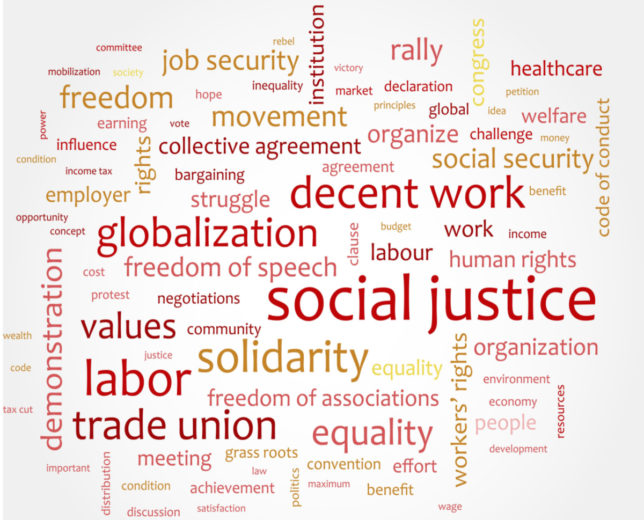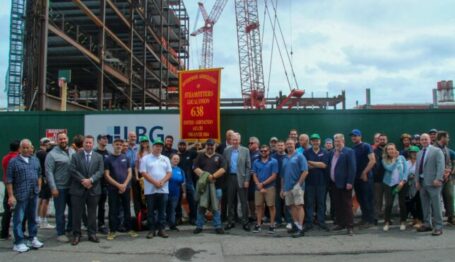Labor Watch
Is DEI Fine If Big Labor Rather Than Big Business Demands It?
 Credit: ojka. License: Shutterstock.
Credit: ojka. License: Shutterstock.

A leading complaint of the “labor conservatives” aligned with Sens. J.D. Vance (R-OH), Marco Rubio (R-FL), and Josh Hawley (R-MO) is that American business, especially big businesses, is increasingly aligned with the social-liberal left. They are not entirely wrong. Under aggressive pressure from left-wing activists, including expansive use of the secondary boycott, many of the largest corporations have adopted left-wing approaches to diversity, equity, and inclusion (DEI); abortion facilitation; election-administration policy, and other social policies.
The solutions proposed by the labor conservatives and the think tank American Compass (Sen. Rubio’s chief of staff, Michael Needham, sits on its board) all point in one direction. They include sectoral bargaining, which would give labor unions more power to coerce workers to accept working standards favorable to unions; works councils, nominally independent representative formations that would be easily influenced by labor unions; and ultimately granting direct worker—read “union,” based on the European experience—representation on corporate governing boards.
All these solutions would strengthen Big Labor even if the labor conservatives’ messaging disclaims that likely effect. But, presuming that the labor conservatives’ aims include protecting social conservatives from “woke” corporations, would strengthening organized labor do so?
Marco’s Little Error
Sen. Rubio has written:
It is no fault of Amazon’s workers if they feel the only option available to protect themselves against bad faith is to form a union. Today it might be workplace conditions, but tomorrow it might be a requirement that the workers embrace management’s latest “woke” human resources fad.
The honorable senior senator from Florida is wrong. Labor unions are if anything the press gangs of woke fads rather than defenders against such. (The Amazon Labor Union, about which Sen. Rubio was writing, is not likely different from its Big Labor counterparts in this regard, based on its support for advocacy of “Free, Safe, Legal Abortion on Demand.”) Last week brought more evidence, as the AFL-CIO’s Department for Professional Employees (DFPE) issued its legislative agenda for the arts, entertainment, and media industries in the 118th Congress.
Full-Spectrum Woke Leftism
Among the unions in DFPE are major entertainment unions including Actors’ Equity, the American Federation of Musicians, the International Association of Theatrical Stage Employees (IATSE), and SAG-AFTRA, giving DFPE an important position in the entertainment industry. Leading the media coverage of the policy agenda at business-of-entertainment news sites Deadline and Broadway World was DFPE’s redoubling of organized labor’s commitment to pushing left-wing racial- and sexuality-related policies under DEI auspices, not its general support of left-wing economic policy, most prominently the very bad Protecting the Right to Organize Act.
Vowing to “remove the systemic, societal barriers that hold too many people back to help ensure that our industries can fully reflect the mosaic of America,” DFPE’s member unions in arts and media demanded legislation to prohibit discriminatory action based on the appearance of a person’s hair. They demanded passage of the highly controversial Equality Act, which would, in the words of National Review’s editors “use the Civil Rights Act as a Trojan Horse for radical leftist social orthodoxies.” And they demanded legislation to codify the pre-2022 Roe-Casey abortion access regime under the euphemism “protect the right of people to make their own reproductive healthcare decisions.”
Social Justice Unionism, Again
DFPE’s position and Sen. Rubio’s errors are easily explained by social justice unionism, the ideological process through which organized labor aligns directly with the full-spectrum left-wing agenda. And since it is an ideological process rather than a self-interested one (self-interest in an environment featuring an increasingly left-wing professional-managerial class is likely the principal cause of “woke capitalism”), there is no limiting principle to how aggressive organized labor under social justice unionism can be. As I have previously argued:
Unlike the would-be robber barons in increasingly woke capital who self-interestedly seek to protect their elite status against a powerful Left that might otherwise turn on them, the professional-managerial “folx” who run organized labor enforce conformity to satisfy their own consciences. (Their status, power, and six-figure salaries are merely perks.) Giving them more power—whether through easily captured “works councils” and corporate-board seats as Senator Rubio proposed in the last Congress, or by placing powerful fingers on the scale for Big Labor as Senator Hawley proposed during the potential rail strike in 2022—would be a massive strategic blunder.
Until the American Compass types and the public officials who push the group’s agenda can provide a path to breaking the social justice unionist control of the labor movement, any acts to strengthen the labor movement strengthen the adversaries not only of the businesspeople who have long been allies of social conservatives but also the workers who already support conservative causes. It is difficult to see that changing.



